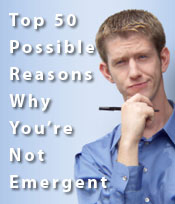
This morning we were greeted with an urban taste of rap for worship. Ohmega Watts shared his hip-hop gospel songs for us. Personally I loved it. I grew up on KSOL and Marvin Gaye. Buy this guys music. It’s good. A few of us stood in the back dancing and enjoying the sounds. But I’m sure there were a few who weren’t quite used to rap as an expression for worship. On top of that, Ohmega has two friends break dancing behind him. It was pure Tom, swinging for the fences. If you can, check out Ohmega’s music on iTunes. His lyrics were exceptional.
Ohmega gave way to Efrem Smith, co-author of The Hip Hop Church. To be honest, Efrem was speaking my language. He spoke for at least an hour on what it means to be loved first so we can love. And much of what we do is look for our identity in everything but God. And what we get is a reflection of the broken self. I really loved his breakdown of agape and God’s expressive love flowing through us.
He presented a rousing call to tear down the traditional oppressive structures that is “white” church. I’m sure he pushed a few buttons but his call to essentially “get real” is needed if we’re going to find God’s purest reflection in humanity, one based on many races and colors.
I appreciated his message so much I attend his break out session immediately following. It was a more detailed breakdown on the history of what we know as church in American culture, which has stripped away any culture references such as German, Irish, or Swedish. For a lot of people who come from predominantly white communities, this was a wake up call. The questions that followed revealed the tension around this issue. Some were really struggling with it.
The hard part of this issue is sitting with the tension and listening to the black community share what it feels and not feel like I’m the oppressor. I’m a white guy. But Efrem was very clear to say that he wasn’t bashing people. He was interested in moving past the white or black church to a multicultural church. He also shared a frustration that much of the publishing industry won’t give voice to the black community. I hope this changes in the future.
I sat in the balcony during the morning service and as I was walking out, I ran into Mark Scandrette. What a great guy. We shared lunch together and talked about what it means to love in community and really practice following Jesus. We shared stories about ministry and what it means to really practice love. He’s contemplating writing a new book called The Jesus Dojo. Right there I knew I had to go to his session.
I ended up meeting a new guy named Dan. I wish I had gotten your last name. If you visit, drop me a line. We talked for at least twenty minutes about what it means to start a church from a discipleship perspective. I could have talked for hours with this guy. He just came out from New Orleans and was looking to plant a church. We talked about what it would mean to flip the church and have the Sunday service support the discipleship communities. Much love Dan in your mission in Seattle.
We both walked to Mark’s session and he shared what it means to live in a new monastic community. Much of what he spoke of is on his site, especially his seven vows. The crowd really responded to his message. He’s a creative visionary and I hope that he writes his book soon. If anyone knows of an agent willing to talk with him, he’s beginning to look. Mark shared one thing that caught my attention in a deeper way. He said, if where you are living is not resonating, maybe it’s time to move to a location that will.
Mark Van Steenwyk, Roy Soto, and Eileen Hanson shared their thoughts on mission in different communities. I missed part of this because I was late. Sorry Mark.
The last session was Mark Scandrette’s wife Lisa, Mike Morris, and Andrew McLeod. They each shared some really interesting perspectives on co-ops, family life in communal living, and Mike shared his wit as a Friar. Again, but I understand why, was too short.
Tom and Christine had us finished with an exercise that surprised me. We each had to imagine a way we could bring renewal into our lives. I closed my eyes and could instantly see Jesus walking up to me and he sat down next to me. I fully expected him to tell me what he wanted me to do. But then he just sat there…for two minutes. And then Tom said, “Okay times up.” I opened my eyes and wondered what that was about and then I realized what Jesus was trying to tell me. It was time to just sit with him. Andrew McLeod sat next to me and he had virtually the same thing. Stop and sit with Jesus…just be.
Well, that’s about it. If you missed it there’s always next year. The plans are already in the works. Much love to Tom, Christine, Eliacin, Kathy, Mark S., Mark V., Tomas, Cole, Dan, Lisa, Dwight, Shane, and so many more wonderful people I got to meet. It was really the people who were the face of God to me all weekend. May God bless you.
I uploaded some more pictures from the sessions here.

Ohmega Watts talking with Christine Sine.

Efrem Smith sharing how important it is to let God love us first so we can love.

Mark V., Eileen Hanson, and Roy Soto
Read Full Post »



 When I was in college I had the privilege of reading extensively about the life of Gandhi. The man was brilliant. Here are a few of my favorite quotes I found while doing some research. And what is interesting is that much of what he said, if you put the name of Jesus in front of it, you’d think it was Jesus. I particularly like his ideas on freedom, which have shades of grace underlining them.
When I was in college I had the privilege of reading extensively about the life of Gandhi. The man was brilliant. Here are a few of my favorite quotes I found while doing some research. And what is interesting is that much of what he said, if you put the name of Jesus in front of it, you’d think it was Jesus. I particularly like his ideas on freedom, which have shades of grace underlining them.


























